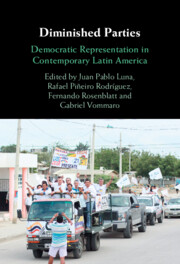Book contents
- Diminished Parties
- Diminished Parties
- Copyright page
- Contents
- Figures
- Tables
- Contributors
- Acknowledgments
- Abbreviations
- 1 Introduction
- 2 The Case of Uruguay’s Frente Amplio
- 3 Horizontal Coordination and Vertical Aggregation Mechanisms of the PRO in Argentina and Its Subnational Variations
- 4 Bolivia’s Movement toward Socialism: A Political Party Based on and Anchored in Social Movements
- 5 The Complex Interaction between Vertical Interest Aggregation and Horizontal Coordination: The PRD and MORENA in Mexico
- 6 PLN and PAC: Two Costa Rican Parties with Constituencies Evolving in Opposite Directions
- 7 The Case of the Traditional Parties in Paraguay
- 8 The Colombian Liberal Party and Conservative Party: From Political Parties to Diminished Subtypes
- 9 “Normal” Parties in Extraordinary Times: The Case of Primero Justicia and Voluntad Popular in Venezuela
- 10 Diminished by Design: Ecuador’s Alianza PAIS
- 11 The Chilean PPD: A Loose Confederation of Leaders
- 12 Fujimorismo and the Limits of Democratic Representation in Peru, 2006–2020
- 13 The Unidad Nacional de la Esperanza: Guatemala’s Only True Political Party?
- 14 Conclusions
- References
- Name Index
- Organization Index
- Subject Index
4 - Bolivia’s Movement toward Socialism: A Political Party Based on and Anchored in Social Movements
Published online by Cambridge University Press: 09 December 2021
- Diminished Parties
- Diminished Parties
- Copyright page
- Contents
- Figures
- Tables
- Contributors
- Acknowledgments
- Abbreviations
- 1 Introduction
- 2 The Case of Uruguay’s Frente Amplio
- 3 Horizontal Coordination and Vertical Aggregation Mechanisms of the PRO in Argentina and Its Subnational Variations
- 4 Bolivia’s Movement toward Socialism: A Political Party Based on and Anchored in Social Movements
- 5 The Complex Interaction between Vertical Interest Aggregation and Horizontal Coordination: The PRD and MORENA in Mexico
- 6 PLN and PAC: Two Costa Rican Parties with Constituencies Evolving in Opposite Directions
- 7 The Case of the Traditional Parties in Paraguay
- 8 The Colombian Liberal Party and Conservative Party: From Political Parties to Diminished Subtypes
- 9 “Normal” Parties in Extraordinary Times: The Case of Primero Justicia and Voluntad Popular in Venezuela
- 10 Diminished by Design: Ecuador’s Alianza PAIS
- 11 The Chilean PPD: A Loose Confederation of Leaders
- 12 Fujimorismo and the Limits of Democratic Representation in Peru, 2006–2020
- 13 The Unidad Nacional de la Esperanza: Guatemala’s Only True Political Party?
- 14 Conclusions
- References
- Name Index
- Organization Index
- Subject Index
Summary
Creating new parties is hard. It requires the development of permanent or at least semipermanent mechanisms of (1) horizontal coordination and (2) vertical interest aggregation. In Latin America, new “electoral vehicles” – organizations that do not meet one or more of the above criteria – are everywhere. Few of these electoral vehicles become political parties in the full sense of the term This chapter offers an account of one of Latin America’s rare party-building successes – the Bolivian MAS (Movement toward Socialism). It explains an under-theorized path to party-building, via autonomous social movements, and shows how movements can shape party organizational models. The analysis reveals that the MAS meets the two criteria for successful party building but retains strikingly fluid organizational attributes. In the absence of strong national and local party structures that can serve as “transmission belts,” it accomplishes horizontal coordination and vertical aggregation through predominantly informal channels, rather than through party structures. The chapter describes these informal channels and discusses their effects on broader issues related to democratic representation, responsiveness, and accountability.
- Type
- Chapter
- Information
- Diminished PartiesDemocratic Representation in Contemporary Latin America, pp. 70 - 92Publisher: Cambridge University PressPrint publication year: 2021



